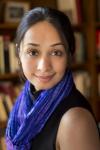Ayesha Ramachandran
Biography
I am a literary critic and cultural historian of early modern Europe. My recent work focuses on Europe’s relations with an expanding world—my first book, The Worldmakers (University of Chicago Press, 2015) charts transnational encounters and the early mechanisms of globalization from the late fifteenth to the early eighteenth centuries. Though I work primarily with the English, French, and Italian literary traditions, my interests extend to Portuguese, Spanish and Neo-Latin materials. In addition, to literary and intellectual historical questions, I am interested in early modern maps (particularly world mapping), the history of science and technology, early modern empires, and the rich visual archive of illustrated books in the period. I have published articles on a range of topics: on Tasso’s use of Petrarch’s Canzoniere in the Gerusalemma liberata; on the importance of Lucretius in the work of Edmund Spenser; on Montaigne’s engagements with Italy and with cosmographic texts in the Essais; on Mughal miniatures from the court of Jahangir and the challenge of cross-cultural comparative studies; and on fundamentalism in early modernity, among other subjects. A new book project, Between Epic and Lyric, examines the hybrid interconnections between the two genres from Petrarch to Spenser.
Education
B.A. Smith College, 2001, magna cum laude
Ph.D. Yale, 2008
Research Interests
Early modern European literature and cultural history; Renaissance poetry; history of science and technology (sixteenth and seventeenth century); cartography and literature; early modern empires and international law; history of philosophy; Europe and the Indo-Islamic world.
Publication Highlights
For a full list of publications and full texts, please see my self-archived articles here.
The Worldmakers: Global Imagining in Early Modern Europe (Chicago: University of Chicago Press, November 2015). [University of Chicago Press]
Spenser and the Human, A Special Issue of Spenser Studies, guest edited with Melissa Sanchez (AMS Press, 2016).
“Traductions cosmographiques dans les Essais de Montaigne,” in Illustrations inconscientes: écritures de la Renaissance. Melanges en l’honneur de Tom Conley, edited by Phillip Usher and Bernd Renner. Paris: Classiques Garnier, 2014. Pp. 121-42. [Classiques Garnier]
“A War of Worlds: Becoming “Early Modern” and the Challenge of Comparison,” in Comparative Early Modernities: 1100-1800,edited by David Porter. New York: Palgrave, 2012, 15-46. [Palgrave]
“Mutabilitie’s Lucretian Metaphysics: Skepticism and Cosmic Process in Spenser’s Cantos,” in Celebrating Mutabilitie: Essays on Edmund Spenser’s Mutabilitie Cantos, edited by Jane Grogan. Manchester: Manchester University Press, 2010, 220-45. [Manchester University Press]
“Edmund Spenser, Lucretian Neoplatonist: Cosmology in the Fowre Hymnes,” in Spenser and Platonism: An Expanded Special Volume, edited by Kenneth Borris, Carol Kaske and Jon Quitslund, Spenser Studies XXIV (2009): 373-411. (Awarded Isabel McCaffrey Prize, 2010) [Ingenta Connect]
Work in Progress
“Between Epic and Lyric: Poetic Innovation in Early Modern Europe” (book manuscript in progress)
Press and Additional Media
Ottoman History Podcast: Episode No. 223. Released: January 30, 2016. [Ottoman History Podcast Website]
The MacMillan Report, March 2016 [YouTube]
